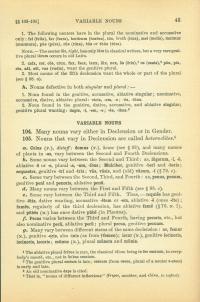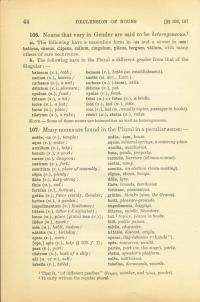104. Many nouns vary either in Declension or in Gender.
105. Nouns that vary in Declension are called heteroclites.1
a. Colus (f.), distaff; domus (f.), house (see § 93), and many names of plants in -u, vary between the 2nd and 4th Declensions.
b. Some nouns vary between the 2nd and 3rd:
iūgerum, -ī, -ō, abl. -ō or -e, plural -a, -um, -ibus
Mulciber, gen. -berī and -beris
sequester, gen. -trī and -tris
vās, vāsis, and (old) vāsum, -ī (§ 79.e).
c. Some vary between the 2nd, 3rd, and 4th.
penus, penum, gen. penī and penoris, abl. penū.
d. Many nouns vary between the 1st and 5th (see § 98.c).
e. Some vary between the 3rd and 5th.
requiēs, gen. -ētis, dat. — , acc. -ētem or -em, abl. -ē (once
-ēte)
famēs, regularly of the 3rd declension, abl. famē (§ 76, Note 1)
pūbēs (m.) has once dat. pūbē (in Plautus).
f. Pecus varies between the 3rd and 4th, having pecoris, etc., but also nom. pecū, abl. pecū; plural pecua, gen. pecuum.
g. Many vary between different stems of the same declension:
femur (n.), gen. -oris, also -inis (as from † femen)
incur (n.), gen. iecinoris, iocinoris, iecoris
mūnus (n.), plural mūnera and mūnia.
106. Nouns that vary in Gender are said to be heterogeneous.2
a. The following have a masculine form in -us and a neuter in -um:
balteus, cāseus, clipeus, collum, cingulum, pīleus, tergum, vāllum
with many others of rare occurrence.
b. The following have in the plural a different gender from that of the singular:
| balneum (n.) bath | balneae (f.) baths (an establishment) |
| caelum (n.) heaven | caelōs [(m.) acc., Lucretius] |
| carbasus (f.) a sail | carbasa, -ōrum (n.) sails |
| dēlicium (n.) pleasure | dēliciae (f.) pet |
| epulum (n.) feast | epulae (f.) feast |
| frēnum (n.) a bit | frēnī (m.) or frēna (n.) a bridle |
| iocus (m.) a jest | ioca (n.), iocī (m.) jests |
| locus (m.) place |
loca (n.), locī (m.) usually topics, |
| rāstrum (n.) a rake | rāstrī (m.), rāstra (n.) rakes |
Note— Some of these nouns are heteroclites as well as heterogeneous.
107. Many nouns are found in the Plural in a peculiar sense:
| aedēs, -is (f.) temple | aedēs, -ium house |
| aqua (f.) water |
aquae mineral springs, |
| auxilium (n.) help | auxilia auxiliaries |
| bonum (n.) a good | bona goods, property |
| carcer (m.) dungeon | carcerēs barriers (of race-course) |
| castrum (n.) fort | castra camp |
| comitium (n.) place of assembly |
comitia an election, |
| cōpia (f.) plenty | cōpiae stores, troops |
| fidēs (f.) harp-string | fidēs lyre |
| fīnis (m.) end | fīnēs bounds, territories |
| fortūna (f.) fortune | fortūnae possessions |
|
grātia (f.) favor |
grātiae thanks |
| hortus (m.) a garden | hortī pleasure-grounds |
| impedīmentum (n.) hindrance | impedīmenta baggage |
| littera (f.) letter (of alphabet) | litterae epistle, literature |
| locus (m.) place [pl. loca (n.)] | locī3 topics, places in books |
| lūdus sport | lūdī public games |
| mōs (m.) habit, custom | mōrēs character |
| nātālis (m.) birthday | nātālēs descent, origin |
| opera (f.) work | operae day-laborers (“hands”) |
| [ops] opis (f.) help (§ 103.f.1) | opēs resources, wealth |
| pars (f.) part | partēs part (on the stage), party |
| rōstrum (n.) beak of a ship | rōstra speaker's platform |
| sāl (m. / n.) salt | salēs witticisms |
| tabella (f.) tablet | tabellae documents, records |


